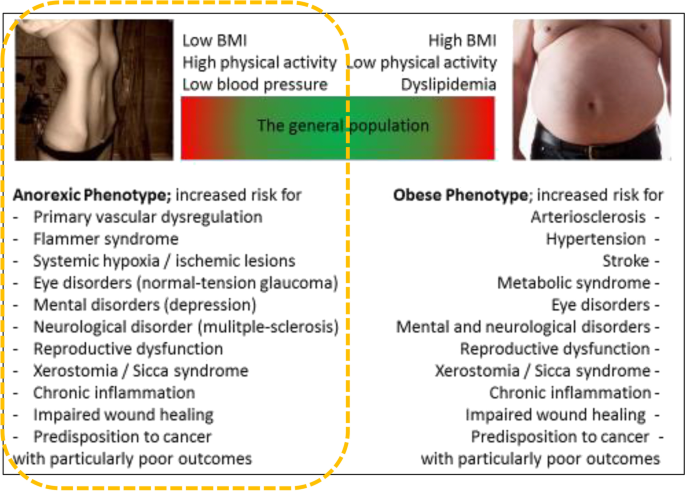Are you underweight and wondering what it could mean for your health? Being lighter than what’s considered healthy might seem harmless, but it can actually put your body at risk in ways you might not expect.
From feeling tired and weak to more serious issues like bone loss and a weakened immune system, the effects can impact your daily life and long-term well-being. You’ll discover the hidden dangers of being underweight, how it affects your body, and why it’s important to pay attention to these warning signs.
Keep reading to learn what you need to know to protect your health and feel your best.
Causes Of Being Underweight
Being underweight results from various factors. Understanding these causes helps identify risks early. Some causes relate to genetics and metabolism. Others involve medical issues or lifestyle choices. Each factor affects body weight differently. Here are the main causes of being underweight.
Genetics And Metabolism
Genes play a role in body size and shape. Some people naturally have a fast metabolism. This means they burn calories quickly. Fast metabolism can make gaining weight hard. Family history often shows similar body types. Genetic factors affect appetite and how food is processed.
Medical Conditions
Certain diseases cause weight loss or prevent weight gain. Conditions like hyperthyroidism increase metabolism too much. Digestive disorders reduce nutrient absorption. Chronic illnesses like cancer or tuberculosis cause weight loss. Mental health issues such as anxiety or depression affect eating habits. These conditions need medical attention for weight management.
Diet And Lifestyle Factors
Poor diet choices can lead to being underweight. Not eating enough calories or nutrients affects body weight. Busy lifestyles may cause skipped meals or unhealthy eating. High physical activity without sufficient food intake causes weight loss. Stress and lack of sleep also impact appetite and metabolism.
Nutrient Deficiencies
Being underweight often means the body does not get enough essential nutrients. This lack can cause serious health problems. Nutrient deficiencies affect many parts of the body and weaken its ability to function well.
Anemia And Vitamin Shortages
Underweight individuals may not consume enough iron, vitamin B12, and folate. These nutrients are vital for making healthy red blood cells. Without enough, anemia can develop. Anemia causes tiredness, weakness, and pale skin. It also reduces the body’s ability to carry oxygen. Vitamin D and calcium shortages are common too. These affect bone strength and overall health. A lack of vitamins A, C, and E weakens the immune system. This makes it harder to fight infections.
Impact On Skin, Hair, And Nails
Skin often becomes dry, pale, and thin without proper nutrients. Hair may become brittle and fall out easily. Nails can grow slowly or become weak and brittle. These signs show the body lacks proteins, vitamins, and minerals. Nutrient shortages reduce the repair and growth of skin, hair, and nails. They also slow down wound healing. Poor nutrition affects the body’s natural ability to stay healthy and strong.
Immune System Weakness
Being underweight can weaken the immune system. This makes the body less able to fight infections and diseases. A weak immune system leads to frequent sickness and health problems. It also affects how fast the body recovers from illness.
Increased Infection Risk
Underweight people often lack essential nutrients. These nutrients help the immune system work properly. Without enough vitamins and minerals, the body cannot defend well against germs. This causes a higher chance of infections like colds and flu. The body may also struggle with more serious infections.
Delayed Recovery From Illness
A weak immune system slows healing. When underweight, the body has less energy to repair itself. Illnesses last longer and may become worse. Slow recovery can lead to more health complications. This makes it important to maintain a healthy weight for faster healing.
Bone And Muscle Loss
Being underweight can lead to serious bone and muscle loss. The body lacks the nutrients needed to keep bones strong and muscles healthy. This loss increases the risk of injuries and long-term health problems.
Maintaining a healthy weight is important to support bone density and muscle strength. Without enough weight, the body may start breaking down muscle tissue and lose bone mass.
Osteoporosis And Fracture Risk
Osteoporosis is a condition where bones become weak and brittle. Being underweight raises the risk of developing osteoporosis. The body does not get enough calcium and vitamin D to keep bones strong.
Thin bones break easily, even from minor falls or bumps. Fractures can cause pain and reduce mobility. This makes daily activities harder and lowers quality of life.
Muscle Weakness And Fatigue
Muscle loss causes weakness and tiredness. The body uses muscle for strength and movement. Low muscle mass means less power to do everyday tasks.
Fatigue occurs because the body lacks energy stores. Being underweight often means fewer calories and nutrients to fuel muscles. This leads to feeling tired and weak all the time.
Heart And Circulatory Problems
Being underweight can affect your heart and blood flow. The heart needs strength to pump blood well. Without enough body weight, the heart may weaken. This can cause serious health problems. Poor circulation can also happen. It means less oxygen and nutrients reach your body.
Heart Muscle Weakness
Low body weight can cause the heart muscle to lose strength. The heart becomes smaller and weaker over time. It struggles to pump blood effectively. This can lead to fatigue and shortness of breath. A weak heart raises the risk of heart failure. Proper nutrition is key to keeping the heart healthy.
Arrhythmias And Poor Circulation
Being underweight can cause irregular heartbeats, called arrhythmias. These can feel like fluttering or a racing heart. Arrhythmias may lead to dizziness or fainting. Poor circulation is common in underweight people. Cold hands and feet or numbness can occur. Poor blood flow slows healing and affects organ function.

Credit: link.springer.com
Reproductive Health Issues
Being underweight can affect reproductive health in serious ways. Women who do not have enough body fat may face challenges with their reproductive system. These problems arise because body fat influences hormones and menstrual cycles. Understanding these risks helps highlight the importance of maintaining a healthy weight for reproductive well-being.
Hormone Imbalances
Body fat plays a key role in producing hormones like estrogen. Low body fat reduces estrogen levels. This causes hormone imbalances that disrupt normal body functions. These imbalances can lead to problems with ovulation and overall reproductive health. Without enough hormones, the body struggles to support a healthy reproductive system.
Menstrual Irregularities And Fertility
Underweight women often experience irregular or absent menstrual periods. This condition is called amenorrhea. Lack of regular periods means ovulation may not occur. Without ovulation, getting pregnant becomes very difficult. Fertility drops because the body is not ready to support pregnancy. These menstrual problems can also signal other health concerns linked to being underweight.
Surgical And Healing Complications
Being underweight can cause serious surgical and healing complications. The body may lack the necessary nutrients to repair itself properly. This can lead to problems before, during, and after surgery. Understanding these risks helps in managing health better.
Slowed Wound Healing
Underweight individuals often heal wounds slowly. The body needs protein and vitamins to rebuild tissue. Without enough nutrients, wounds stay open longer. This increases the chance of infection. Slow healing also means longer hospital stays and more discomfort.
Higher Surgical Risks
Surgery is riskier for those who are underweight. Low body fat and muscle make anesthesia harder to manage. The immune system may be weak, raising infection risk. Blood pressure and heart rate can be unstable. These factors increase complications during and after surgery.
Symptoms To Watch For
Being underweight can affect your body in many ways. Some signs show up before serious problems develop. Watching for early symptoms helps catch health issues sooner. These symptoms can affect your energy, appearance, and mood. Knowing what to watch for can guide you to seek help on time.
Fatigue And Dizziness
Feeling tired all the time is common when underweight. Your body lacks the energy it needs to function well. Dizziness may occur due to low blood sugar or poor circulation. These symptoms can make daily tasks harder and increase the risk of falls.
Hair Loss And Frequent Illness
Hair may become thin or fall out more than usual. This happens because your body lacks nutrients for healthy hair growth. You may also catch colds and infections more often. A weak immune system struggles to fight germs and heal quickly.
Mood Changes
Being underweight can affect your brain and emotions. You might feel sad, anxious, or irritable without clear reasons. Low energy and poor nutrition contribute to mood swings. These changes can impact your daily life and relationships.
Impact On Children And Growth
Children who are underweight face unique challenges that affect their growth and overall health. Proper nutrition plays a key role in healthy development. Without enough nutrients, children can struggle to reach their full potential physically and mentally. Understanding the impact of being underweight during childhood helps highlight the importance of early care and support.
Delayed Physical Development
Underweight children often experience slower growth in height and weight. Their bones may not develop properly, leading to weaker structures. Muscle strength can also be reduced, making physical activities harder. These delays can affect their ability to participate in sports or play with peers. Poor nutrition limits the energy needed for normal growth and daily functions.
Long-term Health Consequences
Being underweight in childhood can cause lasting health problems. It may increase the risk of osteoporosis later in life due to low bone density. Immune system weakness can lead to frequent infections. Some children may face learning difficulties because of inadequate brain development. Chronic underweight status can also affect organ function and overall quality of life as they age.

Credit: link.springer.com
When To Seek Medical Advice
Knowing when to seek medical advice for being underweight is important. It helps prevent serious health problems. Early attention can improve health outcomes. Medical professionals can provide proper diagnosis and treatment plans. Watch for signs that suggest a need for expert help. Persistent weight loss or symptoms like fatigue, dizziness, or frequent illness warrant a visit to the doctor.
Monitoring Weight And Health
Track your weight regularly using a scale. Note any sudden or continuous weight loss. Pay attention to physical symptoms such as weakness or hair loss. Keep a journal of your eating habits and energy levels. Share this information with your healthcare provider. Regular health check-ups help detect underlying issues early. Blood tests can check for nutrient deficiencies and other concerns. Monitoring your health closely supports timely medical intervention.
Available Treatments And Support
Doctors may suggest nutritional counseling to improve diet quality. Supplements can address vitamin and mineral deficiencies. Treatment plans often include a balanced eating schedule. Physical therapy might be recommended to build muscle strength. Mental health support can help if emotional issues affect weight. Support groups provide motivation and shared experiences. Medical teams work together to create a personalized care plan. Early treatment reduces the risk of severe complications.

Credit: www.medicalnewstoday.com
Conclusion
Being underweight can harm your body in many ways. It weakens your immune system and slows healing. Bone and muscle loss may cause weakness and pain. Heart problems and fertility issues are common risks. Feeling tired, dizzy, or depressed can affect daily life.
Children may face growth delays if underweight. It is important to seek medical advice if concerned. Good nutrition and care can help improve health safely. Taking steps early helps avoid serious complications later. Your body needs proper weight to stay strong and healthy.


